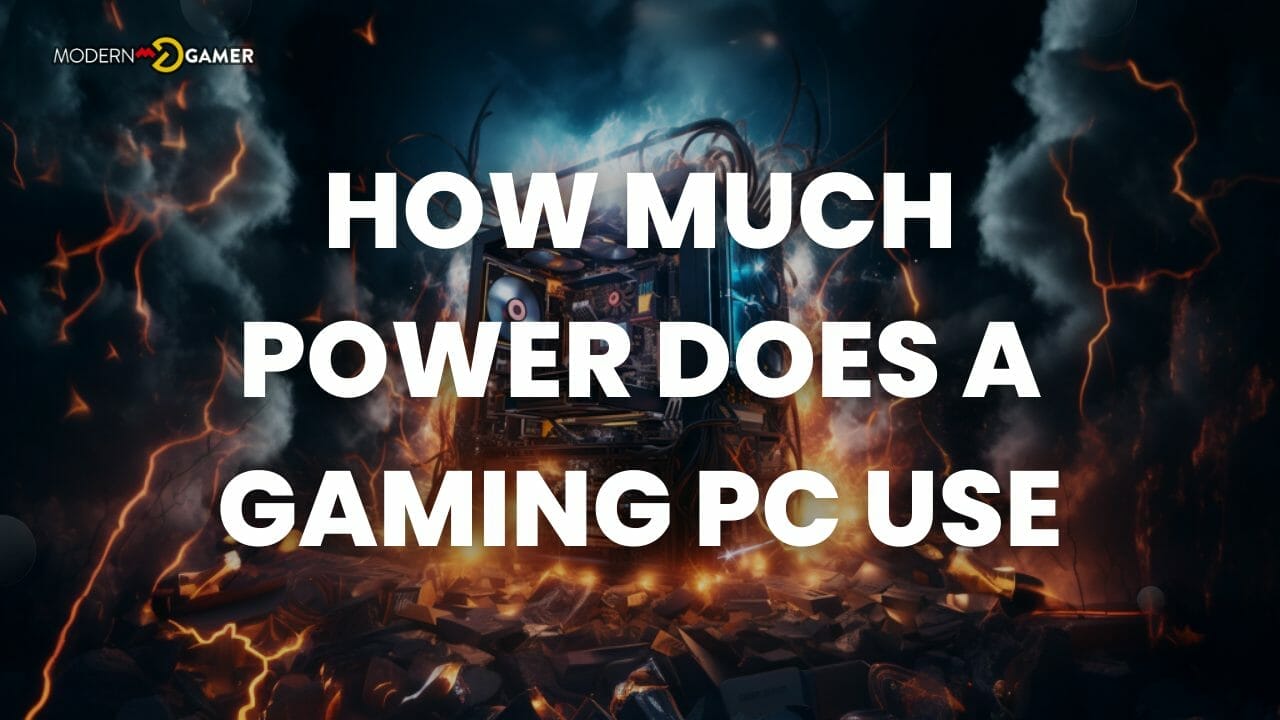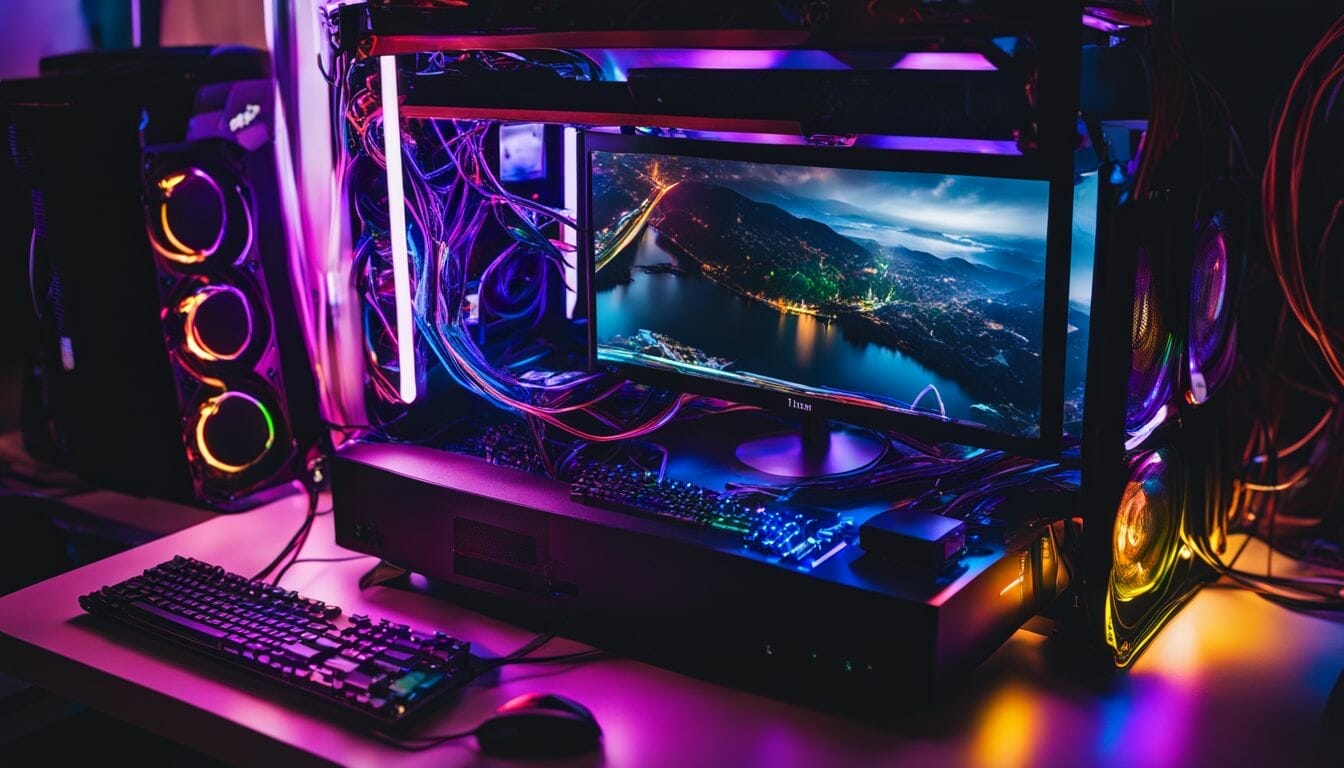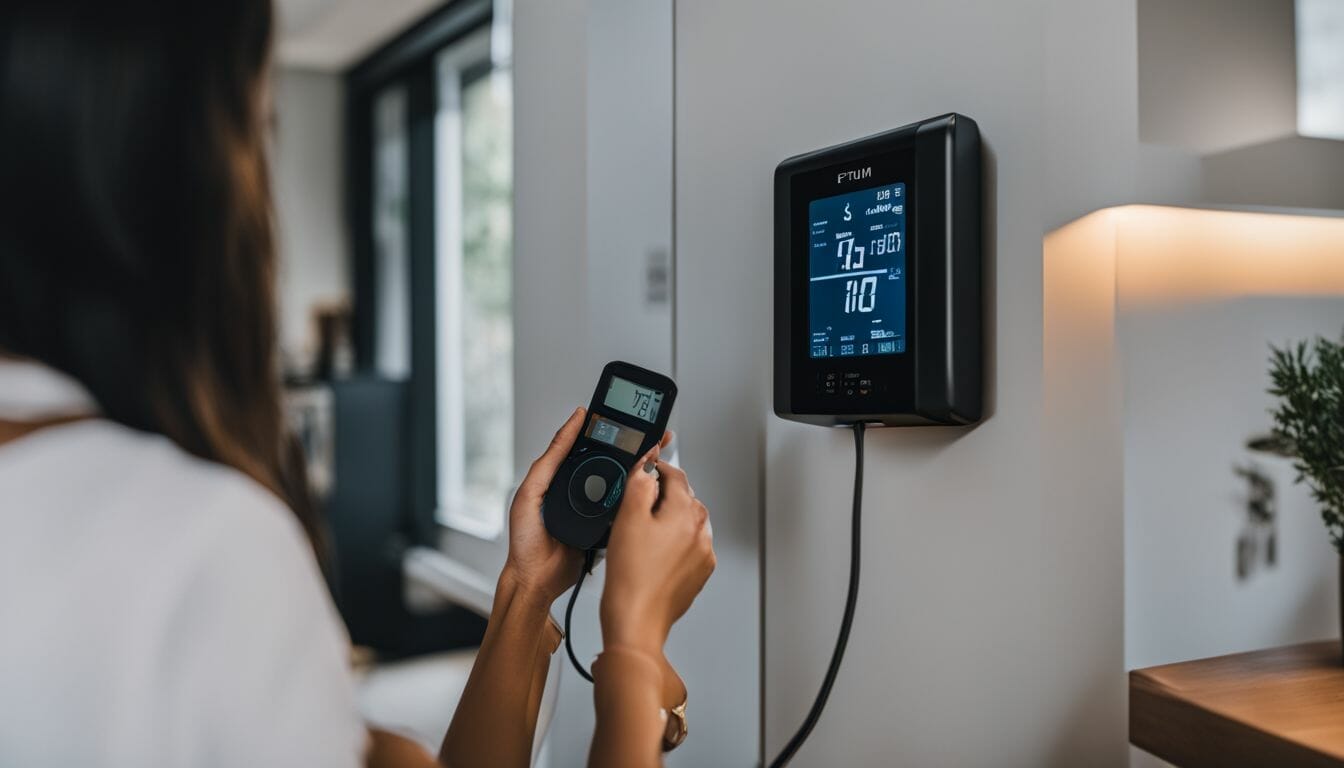Plug-in and Play: How Much Power Does a Gaming PC Use

Ever wondered how much juice your favorite gaming PC uses? Finding out that a typical gaming rig runs between 300 and 500 watts really flips the script on smart choices. This matters big time for anyone who cares about power bills or owning gear that hums without draining wallets. Knowing these numbers helps make better calls on when to game hard or save energy, keeping both performance and costs in check. Dive into this info and get ready to see your gaming setup in a whole new light.
This blog post will guide you through understanding the power consumption of your gaming PC – dissecting components and their individual demands, energy efficacy ratings, tips on reducing usage and calculating costs.
Curious yet? Let’s dive in!
Key Takeaways
- A mid – range gaming PC typically consumes between 300 and 500 watts of power.
- Individual components in a gaming PC have different power consumption levels, such as the CPU requiring 65 to 150 watts and the graphics card needing 100 to 500 watts.
- By monitoring power usage, optimizing settings, upgrading hardware, managing background applications, and using energy-saving modes, gamers can reduce power consumption in their gaming PCs.
How Much Power Does a Gaming PC Use?

The power consumption of a gaming PC can vary depending on several factors and the individual components within the system.
Factors that affect power consumption
Sure, let’s talk about what can make a gaming PC use more or less power. There are many things to keep in mind.
- The PC’s specs: What you have inside your rig really matters. A high-end processor and graphics card will need more power than lower-end parts.
- Extra Power: A power supply pulls around 20% extra power. So, if the parts in your PC need 300 watts, the power supply will pull about 360 watts.
- Heavy Load: Using your gaming PC for simple tasks like word processing won’t take much energy. But if you’re gaming or running other heavy apps, it will use more power.
- Energy consumption: This is simply how much energy your PC uses over time. On average, a gaming PC uses 1400 kWh per year.
- Midrange Power Consumption: If you’ve got a mid-range gaming rig, expect it to use between 300 and 500 watts.
Power consumption of individual components
Different components in your gaming PC will consume different amounts of power. Here’s a rough breakdown of power usage for some common components:
| Component | Power Consumption |
|---|---|
| CPU | 65 – 150 Watts |
| Graphics Card | 100 – 500 Watts |
| Motherboard | 25 – 70 Watts |
| RAM | 2 – 5 Watts per Module |
| Hard Drive | 15 – 30 Watts |
| SSD | 1 – 2 Watts |
| Optical Drive | 15 – 30 Watts |
| Case Fans | 3 – 12 Watts per Fan |
Remember, these are rough estimates and actual power consumption may vary based on the specific model and brand of each component. Some high-end gaming PCs can consume between 700 and 1200 watts when under heavy load. On the other hand, budget gaming PCs that use less powerful components may only use around 300 watts of energy.
Total wattage of a gaming PC
The total wattage of a gaming PC can vary widely. It mostly depends on the parts inside your computer. Entry-level gaming PCs often use between 300 to 500 watts. Mid-range computers need more power, about 500 to 550 watts.
But if you have a budget-friendly setup, it might only use about 300 watts. For those with top-tier gear, expect energy usage to reach up to 700 watts!
Ways to Measure and Reduce Power Consumption

To measure and reduce power consumption, gamers can monitor their power usage and follow tips for reducing energy usage.
Monitoring power usage
To make sure you’re keeping your power consumption in check, here are some ways to monitor your PC’s power usage:
- Install software: There are various software programs available that can measure the power usage of different components in your gaming PC. These programs provide real-time monitoring and display accurate readings.
- Use sensors: Some gaming PCs come with built-in sensors that can measure and display the power usage of individual components. If your PC doesn’t have these sensors, you can purchase external sensors that connect to your computer and provide accurate readings.
- Check Windows power settings: Windows has power settings that allow you to adjust the performance levels of your PC, which affects power consumption. By optimizing these settings, you can reduce energy usage without sacrificing gaming performance.
- Monitor GPU power usage: The graphics processing unit (GPU) is one of the most power-hungry components in a gaming PC. Monitoring its power usage can help you identify any potential inefficiencies and make adjustments as needed.
Tips for reducing power consumption
Reducing power consumption in your gaming PC is important to save energy and lower electricity bills. Here are some tips to help you minimize power usage:
- Optimize power settings: Adjust the power management settings in Windows to make sure your PC is using the appropriate amount of power based on your needs.
- Use energy-saving modes: Enable sleep mode or hibernate mode when you’re not actively using your gaming PC. This can significantly reduce power consumption during idle periods.
- Manage background applications: Close any unnecessary programs running in the background as they can consume additional power. Keep only the essential applications running while gaming.
- Upgrade to efficient hardware: Consider upgrading to more energy-efficient components, such as a high-efficiency power supply unit (PSU) or a graphics card that consumes less power without sacrificing performance.
- Monitor system temperature: Overheating can lead to increased energy consumption, so ensure proper cooling for your gaming PC by cleaning dust from fans and optimizing airflow within the case.
- Turn off peripherals when not in use: Disconnect or turn off peripheral devices like printers, speakers, or external hard drives when they are not being utilized for gaming.
- Use adaptive sync technologies: Adaptive sync technologies, like AMD FreeSync or NVIDIA G-SYNC, can help reduce screen tearing and improve gameplay experience while minimizing power usage.
- Consider battery backup solutions: Investing in an uninterruptible power supply (UPS) can protect your gaming PC from sudden power outages and provide efficient surge protection.
Choosing an Energy-Efficient Power Supply
When choosing an energy-efficient power supply for your gaming PC, it is important to consider the wattage requirements, efficiency ratings, and recommended options that will best suit your needs.
Wattage requirements
When choosing a power supply for your gaming PC, it’s important to consider the wattage requirements. The power consumption of a gaming PC can vary depending on factors like the components you have and how intense your gaming sessions are.
Generally, a gaming PC requires between 300 and 500 watts to run efficiently. However, high-end gaming PCs under heavy load can use anywhere from 700 to 1200 watts. So, it’s essential to calculate the power consumption of your specific setup and choose a power supply that can handle the load efficiently.
Make sure you select a power supply with an output rating that matches or exceeds your PC’s requirements.
Efficiency ratings
When choosing a power supply unit (PSU) for your gaming PC, it’s important to consider the efficiency rating. The efficiency rating tells you how much power is delivered to your components compared to how much wattage is drawn from the wall socket.
A higher efficiency rating means less power consumption and heat generation by the PSU. While higher efficiency ratings often come with a higher price tag, they also mean better components, less wasted power, and lower heat output.
So, when selecting a PSU for your gaming PC, look for models with high efficiency ratings to ensure stable and efficient power delivery.
Recommended power supplies
We recommend considering the following power supplies for your gaming PC setup. These options provide good performance, reliability, and energy efficiency:
- Corsair RM750x: This power supply has a wattage of 750W and is 80+ Gold certified for efficient power usage.
- EVGA SuperNOVA 650 G5: With a wattage of 650W, this power supply is 80+ Gold certified and comes from a reputable manufacturer.
- Seasonic Focus GX-850: This power supply offers a wattage of 850W and is 80+ Gold certified, providing ample power for high-end gaming systems.
- Thermaltake Toughpower GF1 650W: With a wattage of 650W, this power supply is 80+ Gold certified and offers excellent reliability.
Understanding Electricity Costs
Calculating your gaming PC’s energy usage and estimating your electricity bills can help you make informed decisions about power consumption. Learn how to budget for your gaming sessions wisely.
Calculating energy usage
Calculating how much energy your gaming PC uses is important so you can understand its impact on your electricity bill. Here are some steps to help you calculate the energy usage:
- Determine the power consumption per hour: Find out the wattage of your gaming PC by checking its specifications or using a wattage meter. Let’s say it’s around 350 watts per hour.
- Calculate energy consumption per day: Multiply the power consumption per hour by the number of hours you use your gaming PC in a day. For example, if you play games for 5 hours each day, multiply 350 watts by 5 to get 1750 watt-hours.
- Convert to kilowatt-hours (kWh): Divide the total watt-hours by 1000 to get the energy consumption in kilowatt-hours. In this case, divide 1750 by 1000 to get 1.75 kWh.
- Estimate monthly and yearly usage: Multiply the daily energy consumption (in kWh) by the number of days in a month and then by 12 for an estimate of yearly usage. Assuming there are 30 days in a month, multiply 1.75 kWh by 30 and then by 12 to get approximately 630 kWh per year.
Estimating electricity bills
We can estimate our electricity bills by calculating the energy usage of our gaming PC. Here’s how:
- Determine the wattage: Find out how many watts your gaming PC consumes. On average, a gaming PC consumes around 400 watts.
- Calculate daily usage: Multiply the wattage by the number of hours you use your PC each day. For example, if you use it for 4 hours, multiply 400 watts by 4 to get 1600 watt-hours.
- Convert to kilowatt-hours: Divide the total watt-hours by 1000 to convert it to kilowatt-hours (kWh). In this case, it would be 1.6 kWh.
- Multiply by days: Multiply the daily usage in kWh by the number of days you use your PC in a month or year. Let’s say you use it for 5 days a week and there are 52 weeks in a year, so multiply 1.6 kWh by (5*52) to get your yearly usage.
- Calculate energy costs: Multiply your yearly usage in kWh by the cost per kilowatt-hour charged by your electricity provider. If their rate is 13 cents per kWh, multiply this rate with your yearly usage.
- Final estimation: Based on these calculations, you can estimate how much your gaming PC will contribute to your electricity bill each year.
Conclusion
In conclusion, gaming PCs can consume a significant amount of power. Factors like the components and wattage requirements play a role in determining power consumption. Monitoring energy usage and choosing an energy-efficient power supply can help reduce electricity costs.
It’s important to consider the impact of power consumption when using a gaming PC.
FAQs
1. How much power does a gaming PC typically use?
A gaming PC typically uses between 500 to 800 watts of power, depending on the components and usage.
2. Does playing games on a higher graphics setting consume more power?
Yes, playing games on higher graphics settings can consume more power as the hardware works harder to render detailed visuals.
3. Can a gaming PC increase my electricity bill significantly?
Yes, using a gaming PC frequently can increase your electricity bill, especially if it is not energy-efficient or if you spend long hours playing demanding games.
4. Are there ways to reduce the power consumption of a gaming PC?
Yes, you can reduce the power consumption of your gaming PC by optimizing its settings, using energy-saving features such as sleep mode when not in use, and choosing energy-efficient components.
5. Is it necessary to have a high-wattage power supply for a gaming PC?
It is recommended to have an adequate wattage power supply for your gaming PC that matches the requirements of your components and allows for future upgrades without straining the system.
